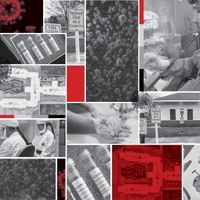Login
Subscribe404
Not Found
Is this what you were looking for?
tag rare diseases microbiology ecology evolution

The Inside Guide: The Gut Microbiome’s Role in Host Evolution
Catherine Offord | Jul 1, 2021 | 10+ min read
Bacteria that live in the digestive tracts of animals may influence the adaptive trajectories of their hosts.

Competition and Cooperation of Cheese Rind Microbes Exposed
Ashley Yeager | Jan 1, 2019 | 4 min read
Transposon mutagenesis give scientists a rare look at the most important interactions within microbial communities.

Researchers Detect Coronavirus in Iowa Deer
Chloe Tenn | Nov 3, 2021 | 3 min read
Multiple white tailed deer tested positive for SARS-CoV-2 likely transmitted from humans, a study finds, indicating the species could act as a reservoir for the virus.

Bacteria and Humans Have Been Swapping DNA for Millennia
Kelly Robinson and Julie Dunning Hotopp | Oct 1, 2016 | 8 min read
Bacteria inhabit most tissues in the human body, and genes from some of these microbes have made their way to the human genome. Could this genetic transfer contribute to diseases such as cancer?

Follow the Coronavirus Outbreak
The Scientist | Feb 20, 2020 | 10+ min read
Saliva tests screen staff and students at University of Illinois; Study ranks species most susceptible to SARS-CoV-2 infection; COVID-19 clinical trials test drugs that inhibit kinin system

Peter Tyack: Marine Mammal Communications
Anna Azvolinsky | Jul 1, 2016 | 9 min read
The University of St. Andrews behavioral ecologist studies the social structures and behaviors of whales and dolphins, recording and analyzing their acoustic communications.

Lost Colonies
Anna Azvolinsky | Oct 1, 2015 | 10+ min read
Next-generation sequencing has identified scores of new microorganisms, but getting even abundant bacterial species to grow in the lab has proven challenging.

Wrestling with Recurrent Infections
Gayatri Vedantam and Glenn S. Tillotson | May 1, 2011 | 10+ min read
Clostridium difficile is evolving more robust toxicity, repeatedly attacking its victims, and driving the search for alternative therapies to fight the infection.
Illuminating Behaviors
Douglas Steinberg | Jun 1, 2003 | 6 min read
Courtesy of Genevieve Anderson If not for Nobel laureates Thomas Hunt Morgan, Eric R. Kandel, and Sydney Brenner, the notion of a general behavioral model might seem odd. Behaviors, after all, are determined by an animal's evolutionary history and ecological niche. They are often idiosyncratic, shared in detail only by closely related species. But, thanks to Morgan's research in the early 20th century, and Kandel's and Brenner's work over the past 35 years, the fly Drosophila melanogaster, t

Some Cancers Become Contagious
Katarina Zimmer | Apr 1, 2019 | 10+ min read
So far, six animal species are known to carry transmissible, “parasitic” forms of cancer, but researchers are still mystified as to how cancer can become infectious.